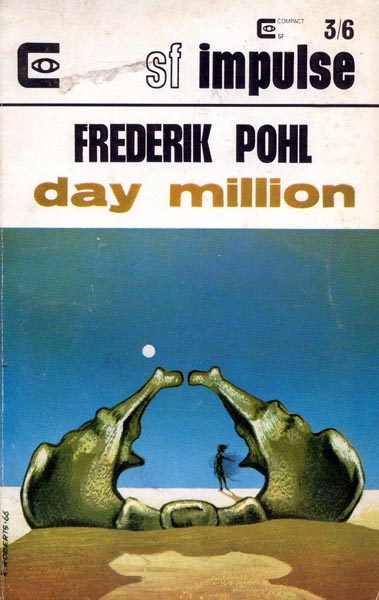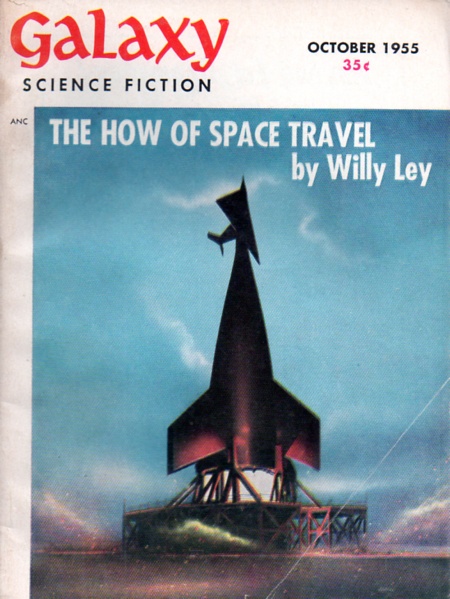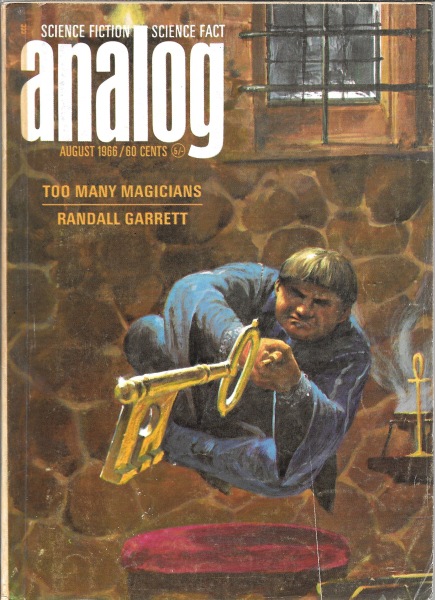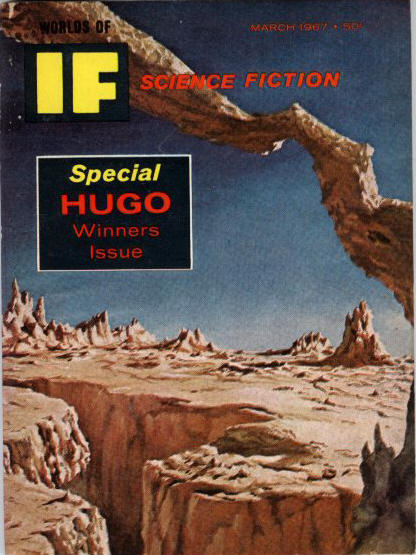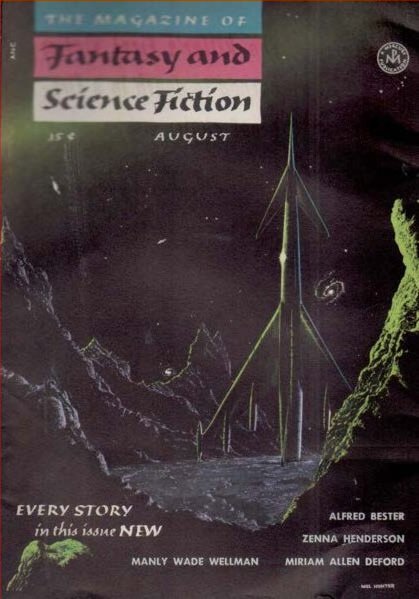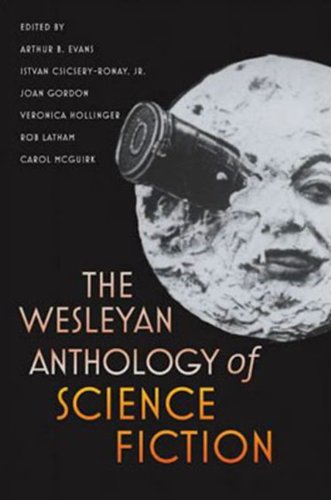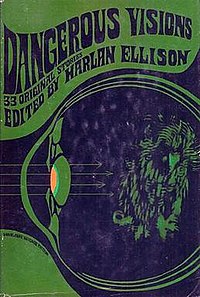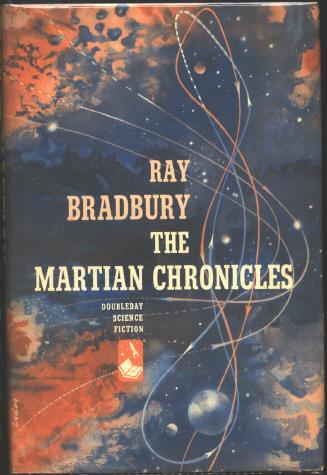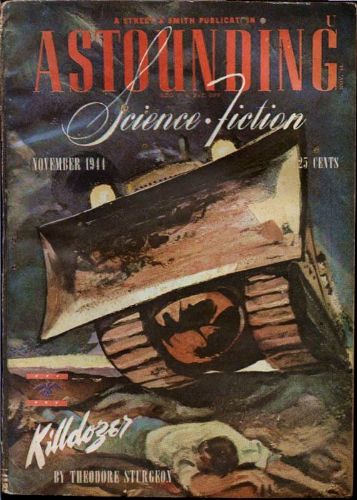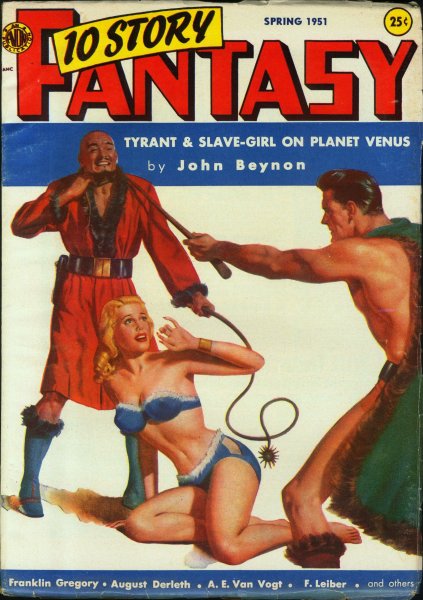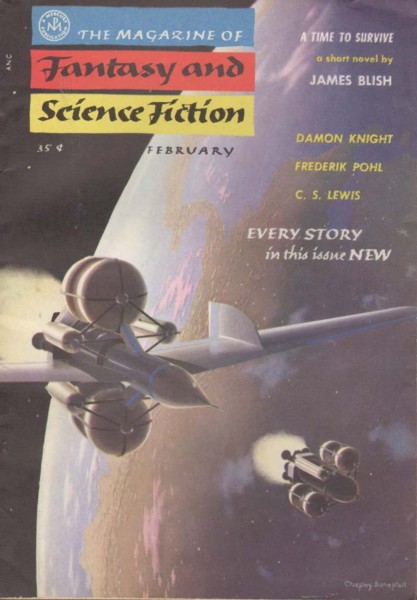Top SF/F/H Short Stories
science fiction awards database
Rankings: | |||||
| SF Novels | FH Novels | Novellas | Novelettes | Short stories | | Scoring Methodology |
Sources: | ||||
| Awards | Citations | Anthologies | ||
1. Bears Discover Fire , Terry Bisson (1990)
Against a backdrop of roadside tire repairs and visits to Mother in a nursing home, a man and his nephew notice groups of bears along the interstate holding torches and building campfires. Sightings of bears are seens in many states and the story goes national, but for the man and his family the situation becomes very personal.
• The story was published without fanfare (no cover blurb) in the August 1990 issue of Asimov's magazine, edited by Gardner Dozois. That it can be read as SF (about evolution, or how climate change enables bears to retain knowledge when they don't have to hibernate) or as fantasy (bears developing fantastic powers), or as magical realism (about cycles of life and new things in the world) perhaps is what enabled it to win so many awards, and be reprinted in so many anthologies (including three by Dozois). (And arguably it was a weak year for short stories, with no other title nominated for more than one of the Hugo, Nebula, World Fantasy, and Sturgeon awards. Such are the factors that affect scores and rankings like these.)
• Bisson also wrote the viral story (not always credited to him) "They're Made Out of Meat." His story "macs" was also a multiple-award winner. His first collection in 1993 was Bears Discover Fire, still available.
• The story was published without fanfare (no cover blurb) in the August 1990 issue of Asimov's magazine, edited by Gardner Dozois. That it can be read as SF (about evolution, or how climate change enables bears to retain knowledge when they don't have to hibernate) or as fantasy (bears developing fantastic powers), or as magical realism (about cycles of life and new things in the world) perhaps is what enabled it to win so many awards, and be reprinted in so many anthologies (including three by Dozois). (And arguably it was a weak year for short stories, with no other title nominated for more than one of the Hugo, Nebula, World Fantasy, and Sturgeon awards. Such are the factors that affect scores and rankings like these.)
• Bisson also wrote the viral story (not always credited to him) "They're Made Out of Meat." His story "macs" was also a multiple-award winner. His first collection in 1993 was Bears Discover Fire, still available.
Score: 49.46
Awards: Hugo Locus Nebula Sfc Sturgeon Wfa | AsimovReader Homer XatafiCyberdark
Compiled anthologies: 12 (listed here); Other anthologies and collections: 4
Citations: 2012LocusOnlinePoll
2. Day Million , Frederik Pohl (1966)
Some thousand years in the future, the narrator/author tells us, there's a boy (who is not exactly a boy, being mostly cybernetic) and a girl (who was born a boy) who fall in love. They make the appropriate exchanges, and never see each other again. The author anticipates his 1960's readers' shocked reactions to many of the story's details, inviting them to reflect on how their own lives would look to someone of a thousand years before.
• First published in men's magazine Rogue in its final, Feb/March 1966 issue (cover image unavailable), and later in the UK magazine SF Impulse in October of that year (cover here), the story slipped under the radar of the Hugo and Nebula voters for that year, being nominated for neither. [Wikipedia is wrong about the story having won a Hugo.] But it's been reprinted many, many times, including in three anthologies in which Pohl chose it as his own favorite story.
• Pohl was prominent in the 1950s as a writer of satirical stories and novels, including "The Midas Plague" and (with C.M. Kornbluth) The Space Merchants, then in the 1960s as a magazine editor, before returning as a writer in full force in the 1970s with Gateway and many later novels. The definitive collection of his best stories is Platinum Pohl.
• First published in men's magazine Rogue in its final, Feb/March 1966 issue (cover image unavailable), and later in the UK magazine SF Impulse in October of that year (cover here), the story slipped under the radar of the Hugo and Nebula voters for that year, being nominated for neither. [Wikipedia is wrong about the story having won a Hugo.] But it's been reprinted many, many times, including in three anthologies in which Pohl chose it as his own favorite story.
• Pohl was prominent in the 1950s as a writer of satirical stories and novels, including "The Midas Plague" and (with C.M. Kornbluth) The Space Merchants, then in the 1960s as a magazine editor, before returning as a writer in full force in the 1970s with Gateway and many later novels. The definitive collection of his best stories is Platinum Pohl.
Score: 48.5
Awards: Hugo Nebula
Compiled anthologies: 23 (listed here); Other anthologies and collections: 6
Citations: 2012LocusOnlinePoll 1971AnalogPoll 1999LocusOnlinePoll
3. The Game of Rat and Dragon , Cordwainer Smith (1955)
This brief and intense story, mostly background until its poignant ending, describes a far future in which human starships travel through space (the "Up-and-Out") by "planoforming" light years at a time. The starships are protected from creatures, dubbed "dragons," that can destroy ships or leave their crews psychotic, by pairs of telepaths on each ship, one a human, the other... a cat.
• This was the second story published by "Cordwainer Smith," a pseudonym (not known until years later) of Paul Linebarger, a Chinese military expert among many other things. It's a tip of the iceberg of Smith's works concerning his elaborate future history about the "Instrumentality of Mankind."
• Later works in that future history include "Alpha Ralpha Boulevard," "The Ballad of Lost C'Mell," "On the Storm Planet," and the novel (first published in two parts) Norstrilia. The definitive volume of his short work is The Rediscovery of Man: The Complete Short Science Fiction of Cordwainer Smith, from NESFA Press.
• This was the second story published by "Cordwainer Smith," a pseudonym (not known until years later) of Paul Linebarger, a Chinese military expert among many other things. It's a tip of the iceberg of Smith's works concerning his elaborate future history about the "Instrumentality of Mankind."
• Later works in that future history include "Alpha Ralpha Boulevard," "The Ballad of Lost C'Mell," "On the Storm Planet," and the novel (first published in two parts) Norstrilia. The definitive volume of his short work is The Rediscovery of Man: The Complete Short Science Fiction of Cordwainer Smith, from NESFA Press.
Score: 47.8
Awards: Hugo
Compiled anthologies: 19 (listed here); Other anthologies and collections: 11
Citations: 2012LocusOnlinePoll 1971AnalogPoll 1999LocusOnlinePoll
4. 'Repent, Harlequin!' said the Ticktockman, Harlan Ellison (1965)
In a regimented future dictated by schedules and punctuality, and where the cost of tardiness is loss of an equivalent amount of time from one's life, a renegade "Harlequin" fights the status quo by causing random mayhem, until summoned by the Master Timekeeper, a.k.a. the Ticktockman.
• This was the first story of prominence by Ellison, who went on to lead a colorful career writing mostly short stories and television scripts. He won many later awards, mostly over the decade following this story's publication. This story gained its author the first of his many Hugo and Nebula awards.
• The definitive volume of Ellison's work is The Essential Ellison, its 50th year update published in 2005 -- though this and its previous editions are only available through second-hand sources.
• This was the first story of prominence by Ellison, who went on to lead a colorful career writing mostly short stories and television scripts. He won many later awards, mostly over the decade following this story's publication. This story gained its author the first of his many Hugo and Nebula awards.
• The definitive volume of Ellison's work is The Essential Ellison, its 50th year update published in 2005 -- though this and its previous editions are only available through second-hand sources.
Score: 47.42
Awards: Hugo Nebula
Compiled anthologies: 17 (listed here); Other anthologies and collections: 21
Citations: 2012LocusOnlinePoll 1971AnalogPoll 1999LocusOnlinePoll
5. The Star, Arthur C. Clarke (1955)
A spaceship expedition to the Phoenix Nebula, 3000 light years from Earth, discovers the remains of an exploded star and of a single planet whose intelligent civilization knew it was about to die, leaving a Vault of artifacts in a bid for immortality. Then the Jesuit astrophysicist narrator's faith is shaken when he realizes when the light from that exploded star reached Earth.
• First published in the first issue of Infinity magazine, a step down from the leading magazines of the era (Astounding, Galaxy, and F&SF), the story became one of the most famous in all science fiction, and was reprinted by Robert Hoskins in his anthology Infinity One (otherwise an original anthology) in 1970.
• Clarke was considered, along with Isaac Asimov and Robert A. Heinlein, one of the "big three" science fiction writers for much of the middle of the 20th century. He is most famous for co-writing the film and novel 2001: A Space Odyssey, for other novels like Childhood's End and Rendezvous with Rama, and for two other short stories further down this list.
• First published in the first issue of Infinity magazine, a step down from the leading magazines of the era (Astounding, Galaxy, and F&SF), the story became one of the most famous in all science fiction, and was reprinted by Robert Hoskins in his anthology Infinity One (otherwise an original anthology) in 1970.
• Clarke was considered, along with Isaac Asimov and Robert A. Heinlein, one of the "big three" science fiction writers for much of the middle of the 20th century. He is most famous for co-writing the film and novel 2001: A Space Odyssey, for other novels like Childhood's End and Rendezvous with Rama, and for two other short stories further down this list.
Score: 46.85
Awards: Hugo
Compiled anthologies: 15 (listed here); Other anthologies and collections: 21
Citations: 2012LocusOnlinePoll 1971AnalogPoll 1999LocusOnlinePoll
6. The Nine Billion Names of God , Arthur C. Clarke (1953)
An American computer company sells a Tibetan lama an “Automatic Sequence Computer” to be used to compile all the possible names of God. In the special alphabet the lamas have devised, they estimate the number to be about nine billion. What will happen when the computer finishes? The end of the world? "Nothing as trivial as that," the monks say.
• This appeared in one of the earliest "original" anthologies, Star Science Fiction Stories No.1 (edited by Frederik Pohl), in 1953, some two years before publication of "The Star." It was the Clarke story included in The Science Fiction Hall of Fame, in 1970, with "The Star" left out because of that volume's groundrules of no more than one story per author.
• Clarke's work alternated (and sometimes overlapped, as in 2001) depictions of near future technological advances with at times mystical speculations about humanity's place in the universe. This and the previous story present two speculations about the nature of humanity and God. Is humanity really so central to God's plan that other intelligent races are expendable? Or is God's plan something so apparently trivial to humanity as the self-aggrandizing task of listing all his names?
• This appeared in one of the earliest "original" anthologies, Star Science Fiction Stories No.1 (edited by Frederik Pohl), in 1953, some two years before publication of "The Star." It was the Clarke story included in The Science Fiction Hall of Fame, in 1970, with "The Star" left out because of that volume's groundrules of no more than one story per author.
• Clarke's work alternated (and sometimes overlapped, as in 2001) depictions of near future technological advances with at times mystical speculations about humanity's place in the universe. This and the previous story present two speculations about the nature of humanity and God. Is humanity really so central to God's plan that other intelligent races are expendable? Or is God's plan something so apparently trivial to humanity as the self-aggrandizing task of listing all his names?
Score: 44.44
Awards: Hugo RetroHugo
Compiled anthologies: 14 (listed here); Other anthologies and collections: 19
Citations: 2012LocusOnlinePoll 1971AnalogPoll 1999LocusOnlinePoll
7. Jeffty Is Five , Harlan Ellison (1977)
A man returns to his hometown to find that his childhood friend Jeffty has never aged past five years old, to the consternation of his parents. Moreover Jeffty has access not only to radio programs and other pop culture from that childhood, but also to new versions of such radio programs and new movies by film stars of that day.
• This is the highest ranking fantasy short story here, unless one considers "Bears Discovery Fire" fantasy and not science fiction. The story was written for a special Harlan Ellison issue of F&SF, which had done occasional such special issues since the early 1960s. It won more awards than any other single Ellison story (though of course there were fewer awards when Ellison began gathering them in the mid-1960s).
• The ending is perhaps ambiguous (see Wikipedia) and Ellison has downplayed the strong current of nostalgia, which echoes his own sympathies, for how candy bars and movies were better in the decades of childhood. Again, the definitive volume of Ellison's work is The Essential Ellison, its 50th year update published in 2005.
• This is the highest ranking fantasy short story here, unless one considers "Bears Discovery Fire" fantasy and not science fiction. The story was written for a special Harlan Ellison issue of F&SF, which had done occasional such special issues since the early 1960s. It won more awards than any other single Ellison story (though of course there were fewer awards when Ellison began gathering them in the mid-1960s).
• The ending is perhaps ambiguous (see Wikipedia) and Ellison has downplayed the strong current of nostalgia, which echoes his own sympathies, for how candy bars and movies were better in the decades of childhood. Again, the definitive volume of Ellison's work is The Essential Ellison, its 50th year update published in 2005.
Score: 41.02
Awards: Hugo Locus Nebula Wfa | BritishFantasy Jupiter
Compiled anthologies: 11 (listed here); Other anthologies and collections: 10
Citations: 2012LocusOnlinePoll 1999LocusOnlinePoll
8. Light of Other Days, Bob Shaw (1966)
A strained English couple, driving through Scotland, stop at a "slow glass" farm. Slow glass is a type of glass that light takes literally years to penetrate, so that a panel of slow glass left in the woods for 10 years will show images of those woods in the apartment of a purchaser living in a city apartment for the following 10 years. As the English couple discover, poignantly, the glass has other uses as well.
• This is the highest ranked short story first published in Analog (or Astounding). It's a perfect example of science fiction that foresees unanticipated uses of new technology.
• Shaw was a respected British SF author who never had another hit this big. He wrote two sequel stories to this story, the three of them fixed-up into novel Other Days, Other Eyes (1972). He wrote a dozen other novels, most prominently Orbitsville (1975), which won a British Science Fiction Association Award. He published a handful of story collections (see isfdb), but there is no definitive collection of his short fiction.
• This is the highest ranked short story first published in Analog (or Astounding). It's a perfect example of science fiction that foresees unanticipated uses of new technology.
• Shaw was a respected British SF author who never had another hit this big. He wrote two sequel stories to this story, the three of them fixed-up into novel Other Days, Other Eyes (1972). He wrote a dozen other novels, most prominently Orbitsville (1975), which won a British Science Fiction Association Award. He published a handful of story collections (see isfdb), but there is no definitive collection of his short fiction.
Score: 39.4
Awards: Hugo Nebula
Compiled anthologies: 12 (listed here); Other anthologies and collections: 12
Citations: 2012LocusOnlinePoll 1971AnalogPoll 1999LocusOnlinePoll
9. When It Changed , Joanna Russ (1972)
On the planet Whileaway a female-only culture exists, 600 years after the original colonists from Earth suffered a plague that killed all the men. Now, a new ship arrives from Earth, full of men who smugly assume the women have been missing something and need men to save them.
• First published in Harlan Ellison's 1972 anthology Again, Dangerous Visions, the story perfectly fit the book's ambition to showcase science fiction ideas that pushed the boundaries, in this case challenging the sexist assumptions of its time.
• Russ was the most overtly feminist writer of her era, best known for this story and for her 1975 novel The Female Man, which includes Whileaway as one of its four fictional worlds. She published three short story collections, and her novella "Souls" (which won a Hugo) was issued as half of a Tor Double in 1989.
• First published in Harlan Ellison's 1972 anthology Again, Dangerous Visions, the story perfectly fit the book's ambition to showcase science fiction ideas that pushed the boundaries, in this case challenging the sexist assumptions of its time.
• Russ was the most overtly feminist writer of her era, best known for this story and for her 1975 novel The Female Man, which includes Whileaway as one of its four fictional worlds. She published three short story collections, and her novella "Souls" (which won a Hugo) was issued as half of a Tor Double in 1989.
Score: 38.99
Awards: Hugo Locus Nebula
Compiled anthologies: 14 (listed here); Other anthologies and collections: 4
Citations: 2012LocusOnlinePoll 1999LocusOnlinePoll
10. I Have No Mouth, and I Must Scream , Harlan Ellison (1967)
In the aftermath of a world war that has left Earth's surface uninhabitable, five people are kept in a cavern and tormented by a vast computer, AM (initially for Allied Mastercomputer), originally developed to fight the war and now expressing insane hatred for the creatures that gave it sentience.
• One of Ellison's most full-throttled stories, its tone of sustained rage and terror makes it quite different from the two Ellison stories listed above. As in other stories of its era and before (by Asimov, Clarke, et al), it presumes that computers of the future would be enormous and all-powerful, and the story further reflects the common fear, still current to this day, that the machines are destined to take over.
• The recent anthology shown here is part of a series of six anthologies by the late James Gunn, among the best wide-scoped anthologies for their thorough introductions describing the author and story background. (The Wesleyan and VanderMeer anthologies are similarly informative.)
• One of Ellison's most full-throttled stories, its tone of sustained rage and terror makes it quite different from the two Ellison stories listed above. As in other stories of its era and before (by Asimov, Clarke, et al), it presumes that computers of the future would be enormous and all-powerful, and the story further reflects the common fear, still current to this day, that the machines are destined to take over.
• The recent anthology shown here is part of a series of six anthologies by the late James Gunn, among the best wide-scoped anthologies for their thorough introductions describing the author and story background. (The Wesleyan and VanderMeer anthologies are similarly informative.)
Score: 38.44
Awards: Hugo Nebula
Compiled anthologies: 12 (listed here); Other anthologies and collections: 18
Citations: 2012LocusOnlinePoll 1971AnalogPoll 1999LocusOnlinePoll
11. Fondly Fahrenheit , Alfred Bester (1954)
"He doesn't know which of us I am these days..." James Vandaleur has inherited an android that is sensitive to heat, growing murderously violent at temperatures above 90 F. From the paddies of Paragon III, to a foundry on Megastar, to student quarters on Lyra Alpha, Vandaleur and the android change identities to avoid discovery, as the interplanetary media reports their crime spree.
• This story displays the author's penchant for razzle-dazzle, pyrotechnical prose and stylistic mannerisms, here using a jumble of pronouns and perspectives to convey growing synesthesia and projectionion as the personalities of man and android blend and merge.
• Though Bester began publishing SF in 1939 (as early as Asimov and Heinlein), most of his best work was published in the 1950s, including novels The Demolished Man (1952) and The Stars My Destination (1956, aka Tiger!, Tiger!), and short stories like "Disappearing Act," "5,271,009," and "The Men Who Murdered Mohammed." The definitive collection of his short fiction is Virtual Unrealities: The Short Fiction of Alfred Bester from 1997.
• This story displays the author's penchant for razzle-dazzle, pyrotechnical prose and stylistic mannerisms, here using a jumble of pronouns and perspectives to convey growing synesthesia and projectionion as the personalities of man and android blend and merge.
• Though Bester began publishing SF in 1939 (as early as Asimov and Heinlein), most of his best work was published in the 1950s, including novels The Demolished Man (1952) and The Stars My Destination (1956, aka Tiger!, Tiger!), and short stories like "Disappearing Act," "5,271,009," and "The Men Who Murdered Mohammed." The definitive collection of his short fiction is Virtual Unrealities: The Short Fiction of Alfred Bester from 1997.
Score: 38.08
Awards: Hugo
Compiled anthologies: 16 (listed here); Other anthologies and collections: 8
Citations: 2012LocusOnlinePoll 1971AnalogPoll 1999LocusOnlinePoll
12. 'All You Zombies—', Robert A. Heinlein (1959)
A young man tells his bartender that he was once a woman, and that her planned career in the space service was ruined when she was seduced by a man who abandoned her and left her pregnant. The bartender offers to help the younger man find the guy who got her pregnant -- with the help of a time machine.
• This was Heinlein's last short story of note, and is one of the tightest, most recomplicated time travel stories ever written. It echoes the longer 1941 novella "By His Bootstraps."
• Heinlein, best known for his dozens of novels, wrote several dozen shorter works, virtually all in the first two decades of his career (from 1939 to 1959). Many of these share the "future history" timeline of stories and novels later collected in The Past Through Tomorrow (1967), including "The Green Hills of Earth" and "Requiem," listed below. A Heinlein collection still available new that includes this story (even though most readers would consider a time travel story to be science fiction) is The Fantasies of Robert A. Heinlein (1999)
• This was Heinlein's last short story of note, and is one of the tightest, most recomplicated time travel stories ever written. It echoes the longer 1941 novella "By His Bootstraps."
• Heinlein, best known for his dozens of novels, wrote several dozen shorter works, virtually all in the first two decades of his career (from 1939 to 1959). Many of these share the "future history" timeline of stories and novels later collected in The Past Through Tomorrow (1967), including "The Green Hills of Earth" and "Requiem," listed below. A Heinlein collection still available new that includes this story (even though most readers would consider a time travel story to be science fiction) is The Fantasies of Robert A. Heinlein (1999)
Score: 37.91
Awards: Hugo
Compiled anthologies: 11 (listed here); Other anthologies and collections: 12
Citations: 2012LocusOnlinePoll 1971AnalogPoll 1999LocusOnlinePoll
13. Aye, and Gomorrah... , Samuel R. Delany (1967)
Future "Spacers" are young men and women who have been neutered in adolescence, to avoid the consequences of radiation in space. In response there come to be people, "frelks," who fetishize the sexless Spacers. The story follows a group of Spacers as they "go up" from one place and "come down" to another, from Paris to Houston to Mexico, and the narrator hooks up with a frelk woman, both unsure of what they really want.
• Delany had already published several novels before this, his first short story, appeared in Harlan Ellison's landmark Dangerous Visions in 1967. He was perhaps the first openly gay science fiction writer, and the most prominent black writer of his era.
• A de facto "best of Delany" collection is Aye, and Gomorrah: And Other Stories. His short works number only a dozen and a half or so; he's also known for novels such as Babel-17, Nova, Dhalgren, and the series beginning with Tales of Nevèrÿon.
• Delany had already published several novels before this, his first short story, appeared in Harlan Ellison's landmark Dangerous Visions in 1967. He was perhaps the first openly gay science fiction writer, and the most prominent black writer of his era.
• A de facto "best of Delany" collection is Aye, and Gomorrah: And Other Stories. His short works number only a dozen and a half or so; he's also known for novels such as Babel-17, Nova, Dhalgren, and the series beginning with Tales of Nevèrÿon.
Score: 36.18
Awards: Hugo Nebula
Compiled anthologies: 12 (listed here); Other anthologies and collections: 4
Citations: 2012LocusOnlinePoll 1971AnalogPoll 1999LocusOnlinePoll
14. There Will Come Soft Rains , Ray Bradbury (1950)
Some 50 years in the future, an automated house wakes up for the day, preparing breakfast for its absent occupants, sending robot mice out to clean, turning on sprinklers. It's the last house left standing on its block, and on one outside wall are the outlines of five people, silhoutted from when the bomb went off.
• Though it's not set on Mars, this story, first published in the general magazine Collier's in May 1950 (cover unavailable), appeared just a few months later as the penultimate story in Bradbury's celebrated The Martian Chronicles. In that book it marks the end of civilization on Earth, and thus the independence of the human colonists on Mars. Like other stories of the 1950s, it reflects the fear of global nuclear annihilation, as well as Bradbury's own distaste for mechanized urban life.
• Only occasionally anthologized on its own (as in Wesleyan, at right), the story has remained in print for decades through dozens of editions of The Martian Chronicles, and in The Vintage Bradbury in 1965 and the 1980 compilation The Stories of Ray Bradbury.
• Though it's not set on Mars, this story, first published in the general magazine Collier's in May 1950 (cover unavailable), appeared just a few months later as the penultimate story in Bradbury's celebrated The Martian Chronicles. In that book it marks the end of civilization on Earth, and thus the independence of the human colonists on Mars. Like other stories of the 1950s, it reflects the fear of global nuclear annihilation, as well as Bradbury's own distaste for mechanized urban life.
• Only occasionally anthologized on its own (as in Wesleyan, at right), the story has remained in print for decades through dozens of editions of The Martian Chronicles, and in The Vintage Bradbury in 1965 and the 1980 compilation The Stories of Ray Bradbury.
Score: 35.84
Awards: none
Compiled anthologies: 10 (listed here); Other anthologies and collections: 26
Citations: 2012LocusOnlinePoll 1971AnalogPoll 1999LocusOnlinePoll
15. Desertion, Clifford D. Simak (1944)
Four explorers to the surface of Jupiter, using a conversion machine to be transformed into creatures able to survive the planet's harsh environment, have failed to return. Now a fifth man volunteers, and takes his dog. Once transformed and on the surface they perceive and understand more than they ever had, and realize why the earlier explorers never came back.
• Like the Bradbury story just above, this can be read on its own, but it also serves as a chapter in a cycle of stories, in this case Simak's book City, which recounts the departure of humans from Earth and the rise of a civilization of intelligent dogs. "Desertion" is significant for its suggestion that humans may not perceive or understand everything there is to know.
• Simak is best known for City and later novels like Way Station and A Choice of Gods, and for short fiction such as "The Big Front Yard" (Hugo winner) and "Grotto of the Dancing Deer" (Nebula winner). Much of his work has been reissued in recent years by Open Road, including an in-progress 12 volume complete short stories; there is no recent "best of" collection.
• Like the Bradbury story just above, this can be read on its own, but it also serves as a chapter in a cycle of stories, in this case Simak's book City, which recounts the departure of humans from Earth and the rise of a civilization of intelligent dogs. "Desertion" is significant for its suggestion that humans may not perceive or understand everything there is to know.
• Simak is best known for City and later novels like Way Station and A Choice of Gods, and for short fiction such as "The Big Front Yard" (Hugo winner) and "Grotto of the Dancing Deer" (Nebula winner). Much of his work has been reissued in recent years by Open Road, including an in-progress 12 volume complete short stories; there is no recent "best of" collection.
Score: 34.98
Awards: none
Compiled anthologies: 16 (listed here); Other anthologies and collections: 19
Citations: 2012LocusOnlinePoll 1971AnalogPoll 1999LocusOnlinePoll
16. Passengers , Robert Silverberg (1968)
Aliens have come to Earth in the form of mind parasites that take over individuals for days at a time, often forcing them to perform acts they would find distasteful or embarrassing, before leaving their subjects with only faint memories of the experience. When a New York City man thinks he recognizes the woman he had a liaison with while they were both "being ridden," he tries to connect with her on a personal basis.
• This is the highest ranking short story to have been published in Damon Knight's series of original anthologies, Orbit, or in any book aside from Harlan Ellison's two anthologies and Frederik Pohl's Star. The last scene of the story was probably more shocking in 1968 than it is now.
• Silverberg has led a long career though various phases, from pulp work in the 1950s to sophisticated literary novels and stories in the '60s and early '70s, to the popular series in the '80s beginning with Lord Valentine's Castle. This story is one of dozens written in the middle period, others including "Sundance" (listed below) and Nebula winner "Good News from the Vatican." A one-volume sampler of his short work is Phases of the Moon: Stories of Six Decades.
• This is the highest ranking short story to have been published in Damon Knight's series of original anthologies, Orbit, or in any book aside from Harlan Ellison's two anthologies and Frederik Pohl's Star. The last scene of the story was probably more shocking in 1968 than it is now.
• Silverberg has led a long career though various phases, from pulp work in the 1950s to sophisticated literary novels and stories in the '60s and early '70s, to the popular series in the '80s beginning with Lord Valentine's Castle. This story is one of dozens written in the middle period, others including "Sundance" (listed below) and Nebula winner "Good News from the Vatican." A one-volume sampler of his short work is Phases of the Moon: Stories of Six Decades.
Score: 33.97
Awards: Hugo Nebula
Compiled anthologies: 10 (listed here); Other anthologies and collections: 10
Citations: 2012LocusOnlinePoll 1971AnalogPoll 1999LocusOnlinePoll
17. The Sentinel, Arthur C. Clarke (1951)
A geological expedition on the moon discovers, on a ledge above Mare Crisium, a metallic pyramid protected by a force field. Once opened it's discovered to be a sophisticated alien machine, set there before life arose on Earth. Why leave such a device on the moon? Perhaps as an "alarm clock" to alert the aliens when intelligence had arisen on Earth.
• First published in an obscure magazine in 1951 (as "Sentinel of Eternity"), and then in Clarke's own 1953 collection Expedition to Earth, the story has become famous for its connection, as an inspiration, to Clarke and Kubrick's film and novel 2001: A Space Odyssey.
• Clarke is one of a small number of writers to have a volume (or series) of "collected stories," in this case The Collected Stories of Arthur C. Clarke (1991). More selective was the earlier collection The Nine Billion Names of God (1967), a de facto "best of," but which is long out of print.
• First published in an obscure magazine in 1951 (as "Sentinel of Eternity"), and then in Clarke's own 1953 collection Expedition to Earth, the story has become famous for its connection, as an inspiration, to Clarke and Kubrick's film and novel 2001: A Space Odyssey.
• Clarke is one of a small number of writers to have a volume (or series) of "collected stories," in this case The Collected Stories of Arthur C. Clarke (1991). More selective was the earlier collection The Nine Billion Names of God (1967), a de facto "best of," but which is long out of print.
Score: 33.34
Awards: none
Compiled anthologies: 12 (listed here); Other anthologies and collections: 24
Citations: 2012LocusOnlinePoll 1971AnalogPoll 1999LocusOnlinePoll
18. The Country of the Kind , Damon Knight (1956)
In a future in which violence has been eradicated, in which everyone is peaceful and kind, a lone exception is a man who has killed his girlfriend and is now punished through ostricizement. People are sanctioned to ignore him, the man goes into a seizure if he causes anyone harm, and a powerful stench warns others of his presence. His response to this supposedly humane treatment is to wreak havoc wherever he can.
• Knight's title, of course, evokes H.G. Wells' "The Country of the Blind," with its suggestion that the exception to the rule has a particular advantage. The story also anticipates Ellison's "Harlequin" with his penchant for causing mayhem, and Robert Silverberg's "To See the Invisible Man," with its punishment by ostracism.
• Knight was a critic, writer, and editor, beginning in the 1950s, and founder or cofounder of the Science Fiction Writers of America and of the Milford and Clarion writers' workshops. His most famous stories are two early ones that end with punchlines: "Not with a Bang" and "To Serve Man", the latter made famous by its adaptation into a Twilight Zone episode.
• Knight's title, of course, evokes H.G. Wells' "The Country of the Blind," with its suggestion that the exception to the rule has a particular advantage. The story also anticipates Ellison's "Harlequin" with his penchant for causing mayhem, and Robert Silverberg's "To See the Invisible Man," with its punishment by ostracism.
• Knight was a critic, writer, and editor, beginning in the 1950s, and founder or cofounder of the Science Fiction Writers of America and of the Milford and Clarion writers' workshops. His most famous stories are two early ones that end with punchlines: "Not with a Bang" and "To Serve Man", the latter made famous by its adaptation into a Twilight Zone episode.
Score: 32.68
Awards: Hugo
Compiled anthologies: 10 (listed here); Other anthologies and collections: 4
Citations: 2012LocusOnlinePoll 1971AnalogPoll 1999LocusOnlinePoll
19. It's a Good Life, Jerome Bixby (1953)
In the small town of Peaksville, population 46, a little boy, Anthony Fremont, has been born with extraordinary powers -- he can read minds, manipulate objects, teleport himself -- and has the impetuous, childish temper of a three-year-old. And so the adults in the town constantly watch their words, and their thoughts, for fear of doing anything that would upset Anthony and trigger him into doing something terrible.
• Like "The Sentinel," this is a story that has perhaps outsized exposure, through anthology reprints, because of a dramatic adaptation, in this case a 1961 episode of The Twilight Zone. There are a couple differences between the story and that episode: in the story Anthony is only 3 years old, which perhaps exacerbates the horror of the town's adults in kowtowing to a child so young. And the jack-in-the-box scene in the episode isn't in the story, only an incident in which Anthony turns a man "into something like nothing anyone would have believed possible."
• Bixby had a modest career as a short story writer (no novels) from the 1950s to the mid-1970s, and aside from this story is best known as the writer of four Star Trek episodes, including "Mirror, Mirror" and "Requiem for Methuselah." The latter's immortality theme also informed his script for the 2007 film The Man from Earth.
• Like "The Sentinel," this is a story that has perhaps outsized exposure, through anthology reprints, because of a dramatic adaptation, in this case a 1961 episode of The Twilight Zone. There are a couple differences between the story and that episode: in the story Anthony is only 3 years old, which perhaps exacerbates the horror of the town's adults in kowtowing to a child so young. And the jack-in-the-box scene in the episode isn't in the story, only an incident in which Anthony turns a man "into something like nothing anyone would have believed possible."
• Bixby had a modest career as a short story writer (no novels) from the 1950s to the mid-1970s, and aside from this story is best known as the writer of four Star Trek episodes, including "Mirror, Mirror" and "Requiem for Methuselah." The latter's immortality theme also informed his script for the 2007 film The Man from Earth.
Score: 31.35
Awards: Hugo RetroHugo
Compiled anthologies: 10 (listed here); Other anthologies and collections: 15
Citations: 2012LocusOnlinePoll 1971AnalogPoll 1999LocusOnlinePoll
20. Harrison Bergeron , Kurt Vonnegut, Jr. (1961)
In 2021 everyone is equal, thanks to amendments to the Constitution and the office of the United States Handicapper General. Thus, a smart man, George Bergeron, is fitted with a transmitter in his ear that goes off with a loud noise every 20 seconds to interfere with any constructive thoughts; ballerinas on TV are fitted out with masks and weights so they don't look or dance any better than anyone else. The story concerns George's brilliant son Harrison, who has been taken away by the H-G men, and then escapes from jail.
• This is a broad dystopian satire in which the premise is virtually the entire story, but it's a savage premise about "equality" and the meritocracy that still has resonance today.
• Vonnegut wrote few short stories, but many well-known novels, including The Sirens of Titan, Cat's Cradle, and Slaughterhouse Five, all considered science fiction, as well as God Bless You, Mr. Rosewater, about a science fiction writer named Kilgore Trout. His principle collection (there's also a Library of America omnibus) is Welcome to the Monkey House.
• This is a broad dystopian satire in which the premise is virtually the entire story, but it's a savage premise about "equality" and the meritocracy that still has resonance today.
• Vonnegut wrote few short stories, but many well-known novels, including The Sirens of Titan, Cat's Cradle, and Slaughterhouse Five, all considered science fiction, as well as God Bless You, Mr. Rosewater, about a science fiction writer named Kilgore Trout. His principle collection (there's also a Library of America omnibus) is Welcome to the Monkey House.
Score: 31.24
Awards: Hugo
Compiled anthologies: 9 (listed here); Other anthologies and collections: 18
Citations: 2012LocusOnlinePoll 1971AnalogPoll 1999LocusOnlinePoll
21. The Last Question , Isaac Asimov (1956)
Score: 30.31
Awards: Hugo
Compiled anthologies: 8 (listed here); Other anthologies and collections: 21
Citations: 2012LocusOnlinePoll 1971AnalogPoll 1999LocusOnlinePoll
22. The Green Hills of Earth , Robert A. Heinlein (1947)
Score: 29.6
Awards: none
Compiled anthologies: 7 (listed here); Other anthologies and collections: 9
Citations: 2012LocusOnlinePoll 1971AnalogPoll 1999LocusOnlinePoll
23. Speech Sounds , Octavia E. Butler (1983)
Score: 29.59
Awards: Hugo Locus Nebula Sfc Wfa
Compiled anthologies: 7 (listed here); Other anthologies and collections: 8
Citations: 2012LocusOnlinePoll 1999LocusOnlinePoll
24. Snow , John Crowley (1985)
Score: 29.53
Awards: Hugo Locus Nebula Sfc Wfa
Compiled anthologies: 9 (listed here); Other anthologies and collections: 4
Citations: 2012LocusOnlinePoll 1999LocusOnlinePoll
25. Or All the Seas with Oysters , Avram Davidson (1958)
Score: 29.5
Awards: Hugo
Compiled anthologies: 10 (listed here); Other anthologies and collections: 7
Citations: 2012LocusOnlinePoll 1971AnalogPoll 1999LocusOnlinePoll
26. Common Time , James Blish (1953)
Score: 29.36
Awards: Hugo
Compiled anthologies: 14 (listed here); Other anthologies and collections: 14
Citations: 2012LocusOnlinePoll 1971AnalogPoll 1999LocusOnlinePoll
27. Coming Attraction , Fritz Leiber (1950)
Score: 29.31
Awards: RetroHugo
Compiled anthologies: 9 (listed here); Other anthologies and collections: 12
Citations: 2012LocusOnlinePoll 1971AnalogPoll 1999LocusOnlinePoll
28. That Only a Mother , Judith Merril (1948)
Score: 28.78
Awards: none
Compiled anthologies: 13 (listed here); Other anthologies and collections: 13
Citations: 2012LocusOnlinePoll 1971AnalogPoll 1999LocusOnlinePoll
29. The Liberation of Earth , William Tenn (1953)
Score: 28.15
Awards: Hugo
Compiled anthologies: 11 (listed here); Other anthologies and collections: 7
Citations: 2012LocusOnlinePoll 1971AnalogPoll 1999LocusOnlinePoll
30. Air Raid, John Varley (1977)
Score: 27.85
Awards: Hugo Locus Nebula Wfa
Compiled anthologies: 7 (listed here); Other anthologies and collections: 9
Citations: 2012LocusOnlinePoll 1999LocusOnlinePoll
31. Even the Queen , Connie Willis (1992)
Score: 27.6
Awards: Hugo Locus Nebula Sfc Sturgeon Wfa | AsimovReader Ignotus Seiun
Compiled anthologies: 6 (listed here); Other anthologies and collections: 7
Citations: 2012LocusOnlinePoll
32. The Man Who Lost the Sea , Theodore Sturgeon (1959)
Score: 26.65
Awards: Hugo
Compiled anthologies: 11 (listed here); Other anthologies and collections: 5
Citations: 2012LocusOnlinePoll 1971AnalogPoll 1999LocusOnlinePoll
33. A Sound of Thunder , Ray Bradbury (1952)
Score: 26.45
Awards: Hugo
Compiled anthologies: 5 (listed here); Other anthologies and collections: 41
Citations: 2012LocusOnlinePoll 1971AnalogPoll 1999LocusOnlinePoll
34. Narrow Valley , R. A. Lafferty (1966)
Score: 26.45
Awards: Hugo Nebula
Compiled anthologies: 11 (listed here); Other anthologies and collections: 6
Citations: 2012LocusOnlinePoll 1971AnalogPoll 1999LocusOnlinePoll
35. The Star , H. G. Wells (1897)
Score: 26.34
Awards: none
Compiled anthologies: 11 (listed here); Other anthologies and collections: 25
Citations: 2012LocusOnlinePoll 1971AnalogPoll 1971AnalogPollPre1940 1999LocusOnlinePoll
36. The Ones Who Walk Away from Omelas , Ursula K. Le Guin (1973)
Score: 25.93
Awards: Hugo Locus Nebula Wfa | Jupiter
Compiled anthologies: 8 (listed here); Other anthologies and collections: 5
Citations: 2012LocusOnlinePoll 1999LocusOnlinePoll
37. Pretty Boy Crossover , Pat Cadigan (1986)
Score: 24.52
Awards: Hugo Locus Nebula Sfc Sturgeon Wfa
Compiled anthologies: 9 (listed here); Other anthologies and collections: 2
Citations: 2012LocusOnlinePoll 1999LocusOnlinePoll
38. The Lottery , Shirley Jackson (1948)
Score: 24.28
Awards: none
Compiled anthologies: 4 (listed here); Other anthologies and collections: 7
Citations: 2012LocusOnlinePoll 1971AnalogPoll 1999LocusOnlinePoll
39. Sundance , Robert Silverberg (1969)
Score: 24.26
Awards: Hugo Nebula
Compiled anthologies: 12 (listed here); Other anthologies and collections: 13
Citations: 2012LocusOnlinePoll 1999LocusOnlinePoll
40. The Golem , Avram Davidson (1955)
Score: 24.15
Awards: Hugo
Compiled anthologies: 11 (listed here); Other anthologies and collections: 9
Citations: 2012LocusOnlinePoll 1971AnalogPoll 1999LocusOnlinePoll
41. The Way of Cross and Dragon , George R. R. Martin (1979)
Score: 23.77
Awards: Hugo Locus Nebula Wfa
Compiled anthologies: 9 (listed here); Other anthologies and collections: 6
Citations: 2012LocusOnlinePoll 1999LocusOnlinePoll
42. Out of All Them Bright Stars , Nancy Kress (1985)
Score: 23.4
Awards: Hugo Locus Nebula Sfc Wfa
Compiled anthologies: 7 (listed here); Other anthologies and collections: 2
Citations: 2012LocusOnlinePoll 1999LocusOnlinePoll
43. Helen O'Loy, Lester Del Rey (1938)
Score: 22.83
Awards: RetroHugo
Compiled anthologies: 7 (listed here); Other anthologies and collections: 12
Citations: 2012LocusOnlinePoll 1971AnalogPoll 1971AnalogPollPre1940 1999LocusOnlinePoll
44. The Men Who Murdered Mohammed , Alfred Bester (1958)
Score: 22.73
Awards: Hugo
Compiled anthologies: 7 (listed here); Other anthologies and collections: 11
Citations: 2012LocusOnlinePoll 1971AnalogPoll 1999LocusOnlinePoll
45. The Things, Peter Watts (2010)
Score: 22.69
Awards: Hugo Locus Nebula Sturgeon Wfa | BritishSF ShirleyJackson
Compiled anthologies: 6 (listed here); Other anthologies and collections: 4
Citations: 2012LocusOnlinePoll
46. The Dog Said Bow-Wow, Michael Swanwick (2001)
Score: 21.93
Awards: Hugo Locus Nebula Sturgeon Wfa | AsimovReader
Compiled anthologies: 7 (listed here); Other anthologies and collections: 4
Citations: 2012LocusOnlinePoll
47. Born of Man and Woman , Richard Matheson (1950)
Score: 21.76
Awards: RetroHugo
Compiled anthologies: 8 (listed here); Other anthologies and collections: 17
Citations: 2012LocusOnlinePoll 1971AnalogPoll 1999LocusOnlinePoll
48. The Fall of the House of Usher , Edgar Allan Poe (1839)
Score: 21.45
Awards: none
Compiled anthologies: 4 (listed here); Other anthologies and collections: 38
Citations: 2012LocusOnlinePoll 1971AnalogPoll 1971AnalogPollPre1940 1999LocusOnlinePoll
49. Rogue Farm , Charles Stross (2003)
Score: 21.36
Awards: Hugo Locus Nebula Sturgeon Wfa
Compiled anthologies: 6 (listed here); Other anthologies and collections: 0
Citations: 2012LocusOnlinePoll
50. The Snowball Effect , Katherine Maclean (1952)
Score: 21.36
Awards: Hugo
Compiled anthologies: 10 (listed here); Other anthologies and collections: 3
Citations: 2012LocusOnlinePoll 1971AnalogPoll 1999LocusOnlinePoll
51. Space-Time for Springers, Fritz Leiber (1958)
Score: 21.28
Awards: Hugo
Compiled anthologies: 8 (listed here); Other anthologies and collections: 6
Citations: 2012LocusOnlinePoll 1971AnalogPoll 1999LocusOnlinePoll
52. Robbie, Isaac Asimov (1940)
Score: 21.1
Awards: RetroHugo
Compiled anthologies: 4 (listed here); Other anthologies and collections: 18
Citations: 2012LocusOnlinePoll 1971AnalogPoll 1999LocusOnlinePoll
53. That Hell-Bound Train , Robert Bloch (1958)
Score: 21.09
Awards: Hugo
Compiled anthologies: 6 (listed here); Other anthologies and collections: 17
Citations: 2012LocusOnlinePoll 1971AnalogPoll 1999LocusOnlinePoll
54. Driftglass , Samuel R. Delany (1967)
Score: 21.05
Awards: Hugo Nebula
Compiled anthologies: 11 (listed here); Other anthologies and collections: 3
Citations: 2012LocusOnlinePoll 1971AnalogPoll 1999LocusOnlinePoll
55. The Damned Thing , Ambrose Bierce (1893)
Score: 20.65
Awards: none
Compiled anthologies: 5 (listed here); Other anthologies and collections: 15
Citations: 2012LocusOnlinePoll 1971AnalogPoll 1971AnalogPollPre1940 1999LocusOnlinePoll
56. Reason, Isaac Asimov (1941)
Score: 20.58
Awards: none
Compiled anthologies: 7 (listed here); Other anthologies and collections: 9
Citations: 2012LocusOnlinePoll 1971AnalogPoll 1999LocusOnlinePoll
57. The Edge of the World , Michael Swanwick (1989)
Score: 20.57
Awards: Hugo Locus Nebula Sfc Sturgeon Wfa
Compiled anthologies: 7 (listed here); Other anthologies and collections: 2
Citations: 2012LocusOnlinePoll
58. Liar!, Isaac Asimov (1941)
Score: 20.38
Awards: none
Compiled anthologies: 6 (listed here); Other anthologies and collections: 11
Citations: 2012LocusOnlinePoll 1971AnalogPoll 1999LocusOnlinePoll
59. Who Can Replace a Man?, Brian W. Aldiss (1958)
Score: 20.33
Awards: Hugo
Compiled anthologies: 7 (listed here); Other anthologies and collections: 18
Citations: 2012LocusOnlinePoll 1971AnalogPoll 1999LocusOnlinePoll
60. The Day Before the Revolution , Ursula K. Le Guin (1974)
Score: 20.18
Awards: Hugo Locus Nebula Wfa | Jupiter
Compiled anthologies: 7 (listed here); Other anthologies and collections: 8
Citations: 2012LocusOnlinePoll 1999LocusOnlinePoll
61. The Drowned Giant [aka Souvenir], J. G. Ballard (1964)
Score: 19.97
Awards: Hugo
Compiled anthologies: 10 (listed here); Other anthologies and collections: 7
Citations: 2012LocusOnlinePoll 1971AnalogPoll 1999LocusOnlinePoll
62. Love Is the Plan the Plan Is Death , James Tiptree, Jr. (1973)
Score: 19.89
Awards: Hugo Locus Nebula Wfa
Compiled anthologies: 3 (listed here); Other anthologies and collections: 7
Citations: 2012LocusOnlinePoll 1999LocusOnlinePoll
63. The Yellow Wallpaper , Charlotte Perkins Gilman (1892)
Score: 19.88
Awards: none
Compiled anthologies: 5 (listed here); Other anthologies and collections: 27
Citations: 2012LocusOnlinePoll 1971AnalogPoll 1971AnalogPollPre1940 1999LocusOnlinePoll
64. A Pail of Air , Fritz Leiber (1951)
Score: 19.85
Awards: none
Compiled anthologies: 9 (listed here); Other anthologies and collections: 13
Citations: 2012LocusOnlinePoll 1971AnalogPoll 1999LocusOnlinePoll
65. Salvador , Lucius Shepard (1984)
Score: 19.7
Awards: Hugo Locus Nebula Sfc Wfa
Compiled anthologies: 9 (listed here); Other anthologies and collections: 6
Citations: 2012LocusOnlinePoll 1999LocusOnlinePoll
66. Smoke Ghost , Fritz Leiber (1941)
Score: 19.42
Awards: none
Compiled anthologies: 6 (listed here); Other anthologies and collections: 17
Citations: 2012LocusOnlinePoll 1971AnalogPoll 1999LocusOnlinePoll
67. Nobody Bothers Gus, Algis Budrys (1955)
Score: 19.39
Awards: Hugo
Compiled anthologies: 8 (listed here); Other anthologies and collections: 4
Citations: 2012LocusOnlinePoll 1971AnalogPoll 1999LocusOnlinePoll
68. The Million Year Picnic , Ray Bradbury (1946)
Score: 19.26
Awards: none
Compiled anthologies: 7 (listed here); Other anthologies and collections: 18
Citations: 2012LocusOnlinePoll 1971AnalogPoll 1999LocusOnlinePoll
69. Poor Little Warrior! , Brian W. Aldiss (1958)
Score: 18.94
Awards: Hugo
Compiled anthologies: 11 (listed here); Other anthologies and collections: 12
Citations: 2012LocusOnlinePoll 1971AnalogPoll 1999LocusOnlinePoll
70. Johnny Mnemonic, William Gibson (1981)
Score: 18.85
Awards: Hugo Locus Nebula Sfc Wfa
Compiled anthologies: 6 (listed here); Other anthologies and collections: 4
Citations: 2012LocusOnlinePoll 1999LocusOnlinePoll
71. Exhalation , Ted Chiang (2008)
Score: 18.82
Awards: Hugo Locus Nebula Sturgeon Wfa | BritishSF Imaginaire
Compiled anthologies: 4 (listed here); Other anthologies and collections: 4
Citations: 2012LocusOnlinePoll
72. October in the Chair , Neil Gaiman (2002)
Score: 18.75
Awards: Hugo Locus Nebula Sturgeon Wfa
Compiled anthologies: 4 (listed here); Other anthologies and collections: 5
Citations: 2012LocusOnlinePoll
73. The Terminal Beach , J. G. Ballard (1964)
Score: 18.7
Awards: Hugo
Compiled anthologies: 8 (listed here); Other anthologies and collections: 8
Citations: 2012LocusOnlinePoll 1971AnalogPoll 1999LocusOnlinePoll
74. Tideline , Elizabeth Bear (2007)
Score: 18.56
Awards: Hugo Locus Nebula Sturgeon Wfa | AsimovReader
Compiled anthologies: 3 (listed here); Other anthologies and collections: 5
Citations: 2012LocusOnlinePoll
75. The Lincoln Train , Maureen F. Mchugh (1995)
Score: 18.53
Awards: Hugo Locus Nebula Sfc Sturgeon Wfa | Homer Sidewise
Compiled anthologies: 6 (listed here); Other anthologies and collections: 4
Citations: 2012LocusOnlinePoll
76. The Third Level , Jack Finney (1950)
Score: 18.48
Awards: none
Compiled anthologies: 8 (listed here); Other anthologies and collections: 9
Citations: 2012LocusOnlinePoll 1971AnalogPoll 1999LocusOnlinePoll
77. The Quest for Saint Aquin , Anthony Boucher (1951)
Score: 18.22
Awards: none
Compiled anthologies: 10 (listed here); Other anthologies and collections: 2
Citations: 2012LocusOnlinePoll 1971AnalogPoll 1999LocusOnlinePoll
78. Singing My Sister Down , Margo Lanagan (2004)
Score: 18.15
Awards: Hugo Locus Nebula Sturgeon Wfa | Aurealis Aurealis Ditmar Ihg Seiun Stoker
Compiled anthologies: 2 (listed here); Other anthologies and collections: 3
Citations: 2012LocusOnlinePoll
79. Slow Tuesday Night , R. A. Lafferty (1965)
Score: 18.04
Awards: Hugo Nebula
Compiled anthologies: 11 (listed here); Other anthologies and collections: 3
Citations: 2012LocusOnlinePoll 1971AnalogPoll 1999LocusOnlinePoll
80. Trouble with Water , H. L. Gold (1939)
Score: 17.97
Awards: none
Compiled anthologies: 8 (listed here); Other anthologies and collections: 11
Citations: 2012LocusOnlinePoll 1971AnalogPoll 1999LocusOnlinePoll
81. Impostor , Philip K. Dick (1953)
Score: 17.86
Awards: Hugo
Compiled anthologies: 8 (listed here); Other anthologies and collections: 16
Citations: 2012LocusOnlinePoll 1971AnalogPoll 1999LocusOnlinePoll
82. The Paper Menagerie, Ken Liu (2011)
Score: 17.76
Awards: Hugo Locus Nebula Sturgeon Wfa | Ignotus Imaginaire Seiun
Compiled anthologies: 3 (listed here); Other anthologies and collections: 2
83. The Hole Man , Larry Niven (1974)
Score: 17.73
Awards: Hugo Locus Nebula Wfa
Compiled anthologies: 5 (listed here); Other anthologies and collections: 4
Citations: 2012LocusOnlinePoll 1999LocusOnlinePoll
84. Creation , Jeffrey Ford (2002)
Score: 17.52
Awards: Hugo Locus Nebula Sturgeon Wfa
Compiled anthologies: 3 (listed here); Other anthologies and collections: 2
Citations: 2012LocusOnlinePoll
85. The Heat Death of the Universe, Pamela Zoline (1967)
Score: 17.44
Awards: Hugo Nebula
Compiled anthologies: 10 (listed here); Other anthologies and collections: 7
Citations: 2012LocusOnlinePoll 1971AnalogPoll 1999LocusOnlinePoll
86. The Island of Doctor Death and Other Stories , Gene Wolfe (1970)
Score: 17.36
Awards: Hugo Locus Nebula
Compiled anthologies: 5 (listed here); Other anthologies and collections: 2
Citations: 2012LocusOnlinePoll 1999LocusOnlinePoll
87. Grotto of the Dancing Deer , Clifford D. Simak (1980)
Score: 17.35
Awards: Hugo Locus Nebula Wfa | AnLab
Compiled anthologies: 7 (listed here); Other anthologies and collections: 4
Citations: 2012LocusOnlinePoll 1999LocusOnlinePoll
88. Buffalo , John Kessel (1991)
Score: 17.31
Awards: Hugo Locus Nebula Sfc Sturgeon Wfa
Compiled anthologies: 4 (listed here); Other anthologies and collections: 3
Citations: 2012LocusOnlinePoll
89. A Bad Day for Sales , Fritz Leiber (1953)
Score: 17.14
Awards: Hugo
Compiled anthologies: 10 (listed here); Other anthologies and collections: 7
Citations: 2012LocusOnlinePoll 1971AnalogPoll 1999LocusOnlinePoll
90. Allamagoosa , Eric Frank Russell (1955)
Score: 17.06
Awards: Hugo
Compiled anthologies: 5 (listed here); Other anthologies and collections: 14
Citations: 2012LocusOnlinePoll 1971AnalogPoll 1999LocusOnlinePoll
91. Billennium, J. G. Ballard (1961)
Score: 17.04
Awards: Hugo
Compiled anthologies: 9 (listed here); Other anthologies and collections: 18
Citations: 2012LocusOnlinePoll 1971AnalogPoll 1999LocusOnlinePoll
92. Nobody's Home, Joanna Russ (1972)
Score: 17.01
Awards: Hugo Locus Nebula
Compiled anthologies: 10 (listed here); Other anthologies and collections: 3
Citations: 2012LocusOnlinePoll 1999LocusOnlinePoll
93. Sail On! Sail On! , Philip José Farmer (1952)
Score: 16.95
Awards: Hugo
Compiled anthologies: 7 (listed here); Other anthologies and collections: 5
Citations: 2012LocusOnlinePoll 1971AnalogPoll 1999LocusOnlinePoll
94. The Mindworm , C. M. Kornbluth (1950)
Score: 16.9
Awards: none
Compiled anthologies: 7 (listed here); Other anthologies and collections: 15
Citations: 2012LocusOnlinePoll 1971AnalogPoll 1999LocusOnlinePoll
95. 26 Monkeys, also the Abyss , Kij Johnson (2008)
Score: 16.89
Awards: Hugo Locus Nebula Sturgeon Wfa | AsimovReader
Compiled anthologies: 3 (listed here); Other anthologies and collections: 5
Citations: 2012LocusOnlinePoll
96. Saucer of Loneliness , Theodore Sturgeon (1953)
Score: 16.87
Awards: Hugo
Compiled anthologies: 6 (listed here); Other anthologies and collections: 8
Citations: 2012LocusOnlinePoll 1971AnalogPoll 1999LocusOnlinePoll
97. The Pusher , John Varley (1981)
Score: 16.86
Awards: Hugo Locus Nebula Sfc Wfa
Compiled anthologies: 6 (listed here); Other anthologies and collections: 2
Citations: 2012LocusOnlinePoll 1999LocusOnlinePoll
98. Cassandra , C. J. Cherryh (1978)
Score: 16.84
Awards: Hugo Locus Nebula Wfa
Compiled anthologies: 6 (listed here); Other anthologies and collections: 4
Citations: 2012LocusOnlinePoll 1999LocusOnlinePoll
99. And I Awoke and Found Me Here on the Cold Hill's Side, James Tiptree, Jr. (1972)
Score: 16.8
Awards: Hugo Locus Nebula
Compiled anthologies: 8 (listed here); Other anthologies and collections: 0
Citations: 2012LocusOnlinePoll 1999LocusOnlinePoll
100. Requiem, Robert A. Heinlein (1940)
Score: 16.76
Awards: RetroHugo
Compiled anthologies: 3 (listed here); Other anthologies and collections: 12
Citations: 2012LocusOnlinePoll 1971AnalogPoll 1999LocusOnlinePoll
101. Answer , Fredric Brown (1954)
Score: 16.65
Awards: Hugo
Compiled anthologies: 9 (listed here); Other anthologies and collections: 11
Citations: 2012LocusOnlinePoll 1971AnalogPoll 1999LocusOnlinePoll
102. The Long Watch , Robert A. Heinlein (1949)
Score: 16.61
Awards: none
Compiled anthologies: 4 (listed here); Other anthologies and collections: 15
Citations: 2012LocusOnlinePoll 1971AnalogPoll 1999LocusOnlinePoll
Copyright 2012 - 2026 by Mark R. Kelly and the Locus Science Fiction Foundation. All rights reserved.


